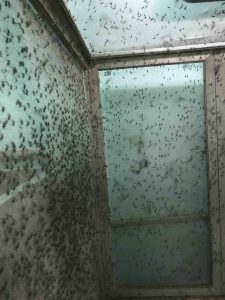By Katrina Rossos
Kaylyn Cullen, a UF senior in the Wildlife Ecology and Conservation department spent her summer internship managing mosquito colonies and working on an internship project that involved feeding blood meal to a certain mosquito species. One of the most memorable experiences of the summer that she noted was walking into a room filled with thousands of mosquitoes that found a hole in their cage—which apparently happened on more than one occasion!
Cullen expressed that she learned a tremendous amount during her internship about the insect, including the fact mosquitoes kill more people via disease transmission than any other animal, but there are several mosquito species that assist humans through pollination and preying on other mosquitoes. “Toxorhynchites is a genus of mosquitoes that do not blood feed (bite) and feed on the larvae of other mosquitoes. This mosquito is actually used as biological control in certain areas,” Cullen explained.
Originally from Panama City, Florida, Cullen has always had an interest in wildlife and spent her childhood outside catching insects and lizards and gaining inspiration from such conservation icons as Steve Irwin.

“I am open to working with any form of wildlife but entomology and herpetology are my specific areas of interest,” Cullen said. “I don’t currently have any plans to pursue graduate school, but I would like to work as a wildlife biologist. I want the focus of my career to be protecting and managing imperiled species.”
Prior to enrolling at UF, Cullen worked at a Mosquito Control District where her supervisors received mosquito eggs from Dan Kline, a research entomologist at Agricultural Research Service (ARS), U.S. Department of Agriculture (USDA). As a result, Cullen began communication with Kline before the internship opened, which was at the Mosquito and Fly Research Unit of USDA ARS CMAVE in Gainesville.

“The main focus of my internship project was analyzing the efficacy of a substitute blood meal in Aedes aegypti mosquitoes (AKA the Yellow Fever mosquito). My role in the project was to design an experiment to test the use of a substitute blood meal in our colony of Ae. Aegypti mosquitoes,” Cullen explained. Her supervisor at the unit was interested in starting a new colony of this mosquito species solely using artificial blood rather than traditional animal blood. The health and behavior of the mosquitoes after they consume the substitute blood meal is currently unknown and something that can be further explored in the future, according to Cullen.
“In addition to my summer project, I would also assist in rearing the colonies of seven mosquito species. We rear them from egg to adult and repeat the process weekly,” noted Cullen. “The mosquitoes are then used by researchers at the USDA, or shipped to other researchers.” The majority of Cullen’s daily work involved maintaining these colonies; the unit averaged approximately one million mosquitoes per month.

“For my experiment, I set up a separate colony and would blood feed them using a substitute blood meal weekly. Then the eggs would be collected and reset for the next generation,” Cullen said. She will continue to maintain this colony in the future, as well as many of the other major colonies, although she has already presented on her artificial blood project.
“Presenting my work on the artificial blood meals for the student seminar was a good experience for me, it was pretty cool to get input from researchers who have been in this field for decades,” she said.
Cullen said that this summer internship experience taught her a great deal, including how research works at the government level and the magnitude of the work that goes on “behind the scenes” that does not receive a lot attention from the public.
 0
0
